Rick Allen recalls his Monsters of Rock drumming re-birth
Def Leppard drummer's improbable, triumphant comeback
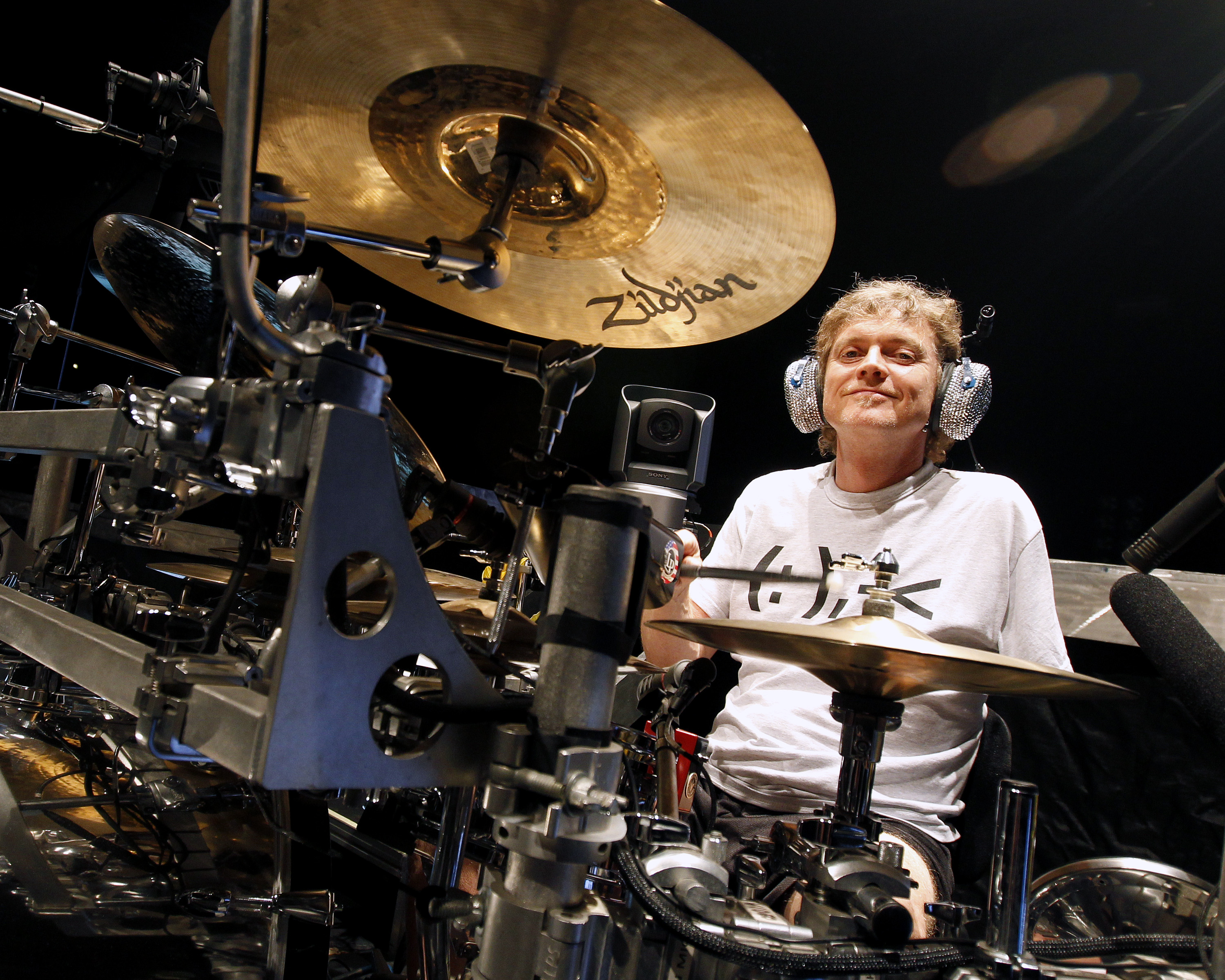
Rick Allen recalls his Monsters of Rock drumming re-birth
August 16 1986 was a pivotal day for Rick Allen. It marked the drumming rebirth of the Def Leppard man at Donington’s Monsters Of Rock, as he made his first major live appearance with the band since losing his left arm in a car crash 18 months earlier.
The show, which saw Leppard below Ozzy Osbourne and The Scorpions on the bill, was a momentous, and hugely daunting return to the stage. With only a smattering of club dates under his belt since the tragic accident, Rick was thrust back into the spotlight in front of tens of thousands of fans eager to see for themselves whether the headstrong drummer could really still power Def Leppard’s energetic goodtime rock.
“Donington is a crossroads in my life”, Rick recalls. “That was where it all changed for me. That was really scary. I didn’t think I could pull it off. But to feel the warmth of a crowd like that, just feeling the sense that they wanted me to succeed and feeling that encouragement was just incredible. What a moment.”
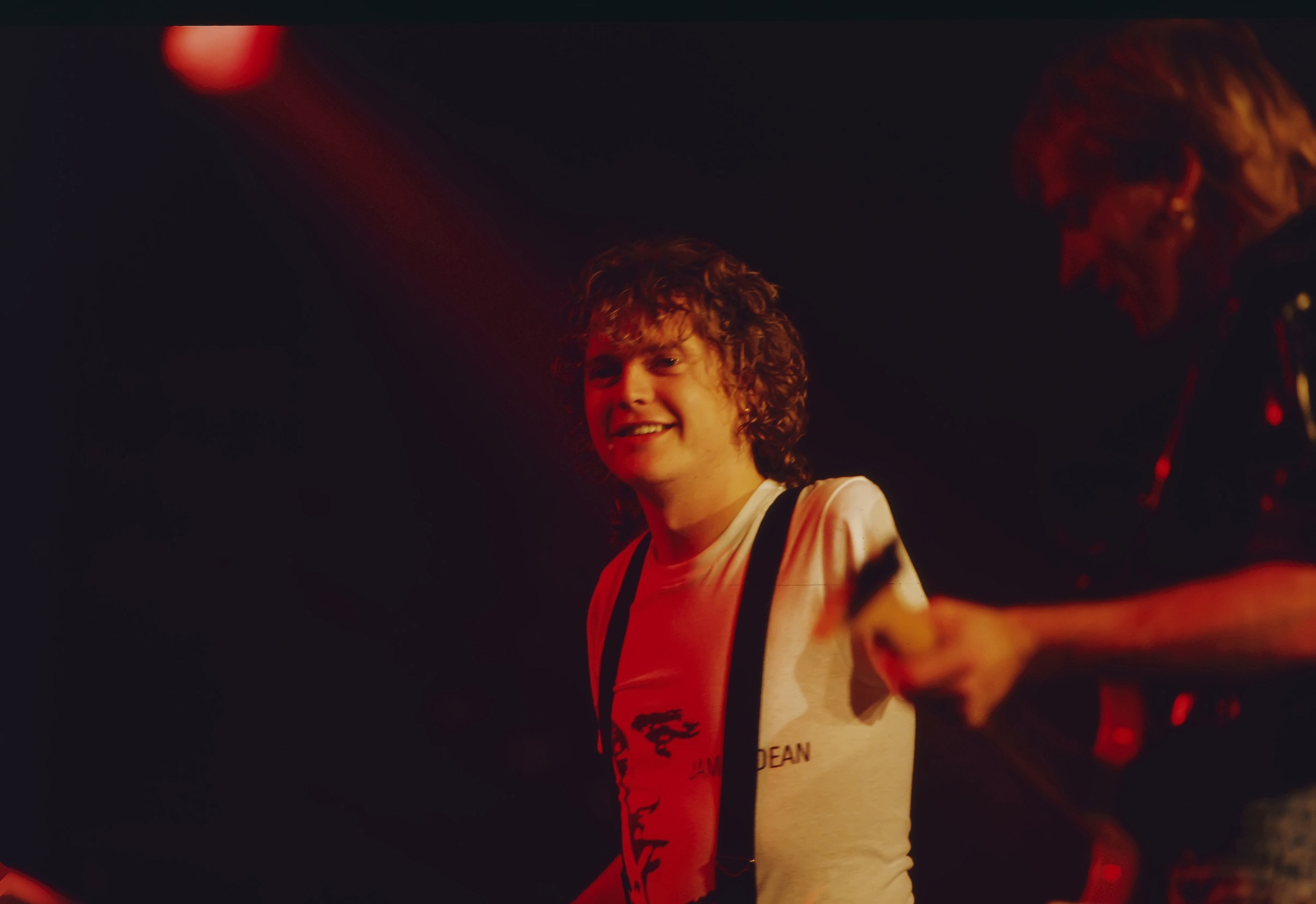
Back from the brink
The return from the brink was made all the more incredible by the fact that within a year Rick’s comeback culminated in Leppard releasing Hysteria, an album that would define their career and go on to sell more than 20 million copies and spawn six hit singles – making them global megastars.
As the band headed to Dublin to write and record what would become Hysteria confidence was high thanks to the success of their 1983 breakthrough record Pyromania. Despite performing fairly modestly in the UK, the album was a smash hit Stateside, only being held off the Billboard Chart’s Number One spot by Michael Jackson’s Thriller.
Rick recalls: “Mutt [Lange, producer] really wanted to make a rock record that crossed over and I think that really did happen with Pyromania. It’s interesting, ‘Bringing On The Heartbreak’ became a hit right before we released Pyromania and then because of the success of Pyromania there was pressure, we did feel pressure [when recording Hysteria].”
That pressure was soon ramped up as the clock began ticking. In fact, the band had been working on the album for the best part of a year as the end of 1984 came into sight. Clues of the almost endless process of writing and recording Hysteria first reared their head as Leppard’s tried and trusted producer Lange announced he was in need of a break and unable to commit to the full record, leading Jim Steinman to step in.
“As you know it took years and years to make the damned thing and then me going through my trials and tribulations, it just set the whole thing back even further.”
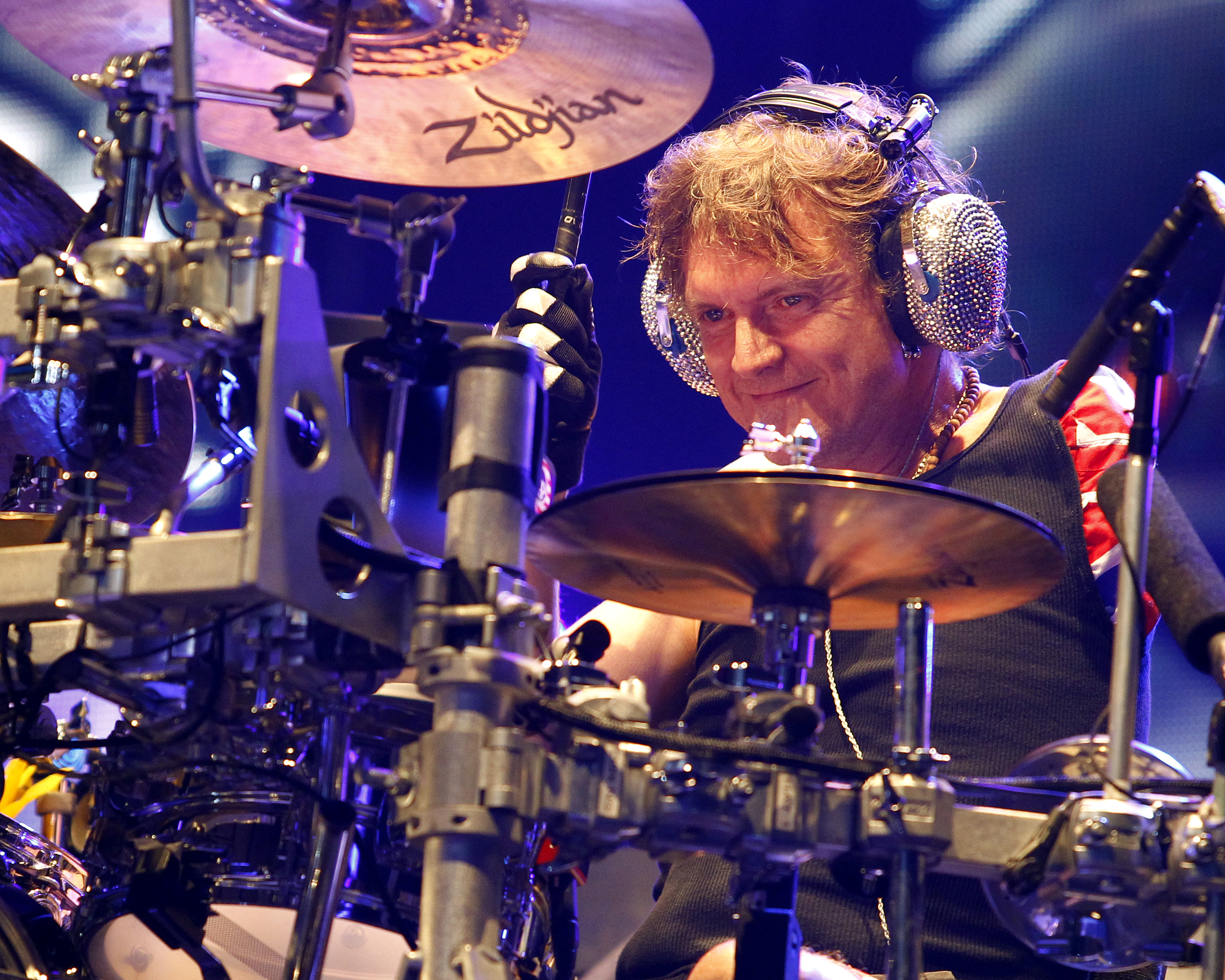
Rick's life changed in an instant
On 31 December 1984 Rick’s life changed forever. While on his way to a New Year’s Eve party in the band’s native Sheffield the then 21-year-old drummer lost control of his car and crashed into a field. The impact severed his left arm and as a result seemingly ended his career behind the kit.
But, Rick didn’t quite see it that way. Thanks to an intense recovery period and a ground-breaking Simmons kit which saw specially designed foot pedals enable his left foot to take care of the tasks once fulfilled by his left arm, Rick returned to the studio to continue working on Hysteria, joining Lange who had come back out of exile. The size of the job ahead was not lost on him.
He tells us: “As you can imagine for me it felt like a huge task at that moment in time. I guess I felt somewhat overwhelmed at the prospect of having to do all of these songs.”
The mammoth undertaking was made all the more daunting by the new painstaking process of laying down drum tracks that Rick was having to come to terms with, as each song needed several takes to nail the complex hybrid of acoustic kit, cymbals and electronics.
“What we did was we kept a lot of the drum machine parts and I went in and overdubbed real kit and also overdubbed cymbals,” he explains. “I was able to play drum part, play cymbal part and then piece the things together, which helped. Then using a lot of the drum machine stuff underneath it and it actually sounded really good.”
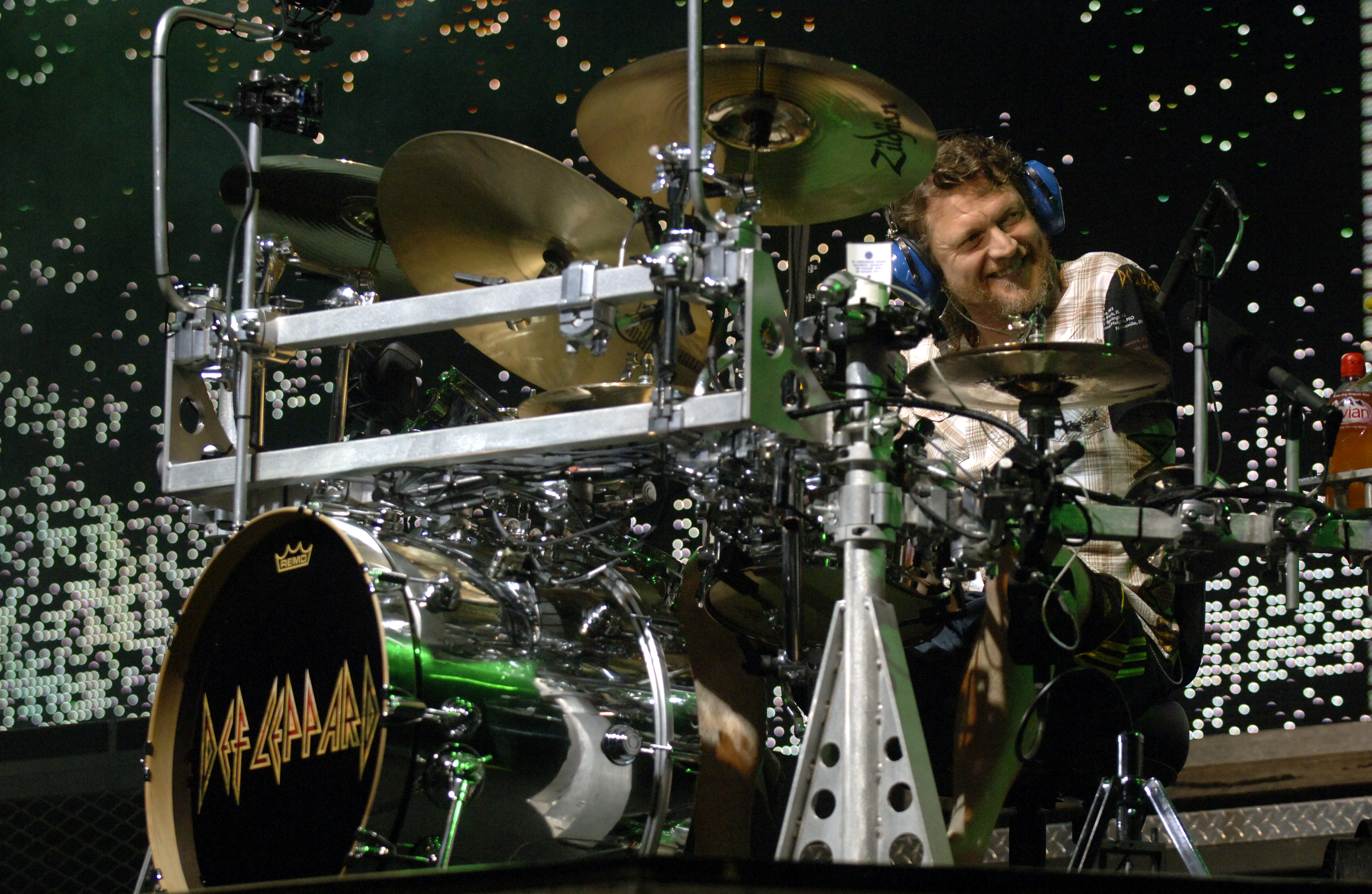
A new undertaking
Despite progress being slow, things were moving again in the Leppard camp and Rick was thankful for the almost snail’s pace development of Hysteria.
“For me it [the recording process] was a completely new undertaking. I’d never been faced with something like that before. In a way it was fortunate that the record took so long to make because it gave me the time to integrate everything that had happened to me and how to get my head around it and how I was going to pull that off in a live setting. It was nice that I had a good year before I had to go out and play.”
With the notoriously demanding Lange pushing the band to their limits, Rick gained a mentor in the development of his enforced and ever evolving new drum style.
“Mutt was so involved in the whole process and that’s why he’s such a huge influence on how I started to play because he would constantly be questioning why I was doing something. Not trying to be weird or anything but really honing in on the importance of every single thing that was put down. That was a huge learning curve for me, sitting there with a master. Somebody that was a master songwriter and knew how to craft a song. None of it was frivolous. Yes, there was room for spontaneity but at the same time it was really scrutinised to the point that every single beat on the record was accounted for, It was pretty scary because there were times when I was like, ‘I don’t know whether I can do this.’ It made me feel a little inadequate at times, but it’s like anything, if you stick at it you just grow into it. Now it’s second nature and just comes naturally. When you hear something you just punctuate it.”
While Lange’s demands had, and continue to have, a huge impact on Rick’s playing, they also further fuelled the frustration of what seemed to be a never-ending studio session, as the months, and even years, ticked by with Hysteria still not yet in the can.
Rick admits: “I walked in the studio sometimes and Joe [Elliott, Def Leppard frontman] would almost be in tears thinking he couldn’t do it, well not the way Mutt wanted him to do it. We all felt that way. You felt inadequate because you weren’t sure if you could deliver what Mutt was asking you to deliver. The interesting thing about him is very rarely does he compromise. He would keep pushing. It’s like he wouldn’t challenge you, he’d have you challenge yourself. You’d go away and think, ‘F***ing hell, I need to get this down. I need to play this.’ To the point you would question your ability to actually play.”
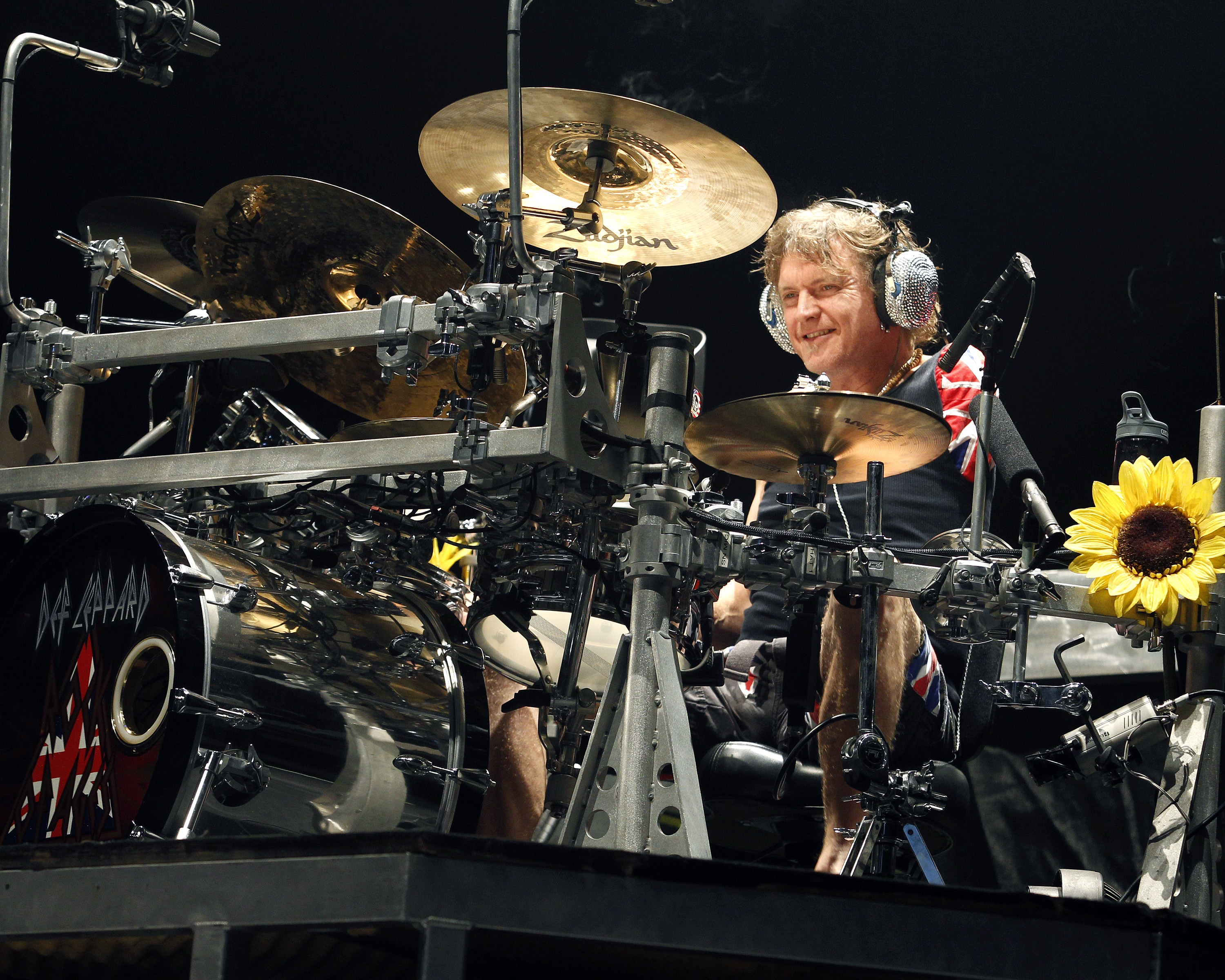
Something special
As the punishing process went on, the band pulled through in the knowledge that they were on the cusp of creating a life changing record - an album that would go on to be regarded as a rock classic and propel them to legendary status.
“We all knew we had something special,” Rick says. “Everybody felt really good about it but we’d spent so much damned money making the record that we were a little bit afraid that we weren’t going to be able to recoup the amount of money that we’d spent on recording. It was crazy. We had to sell some ridiculous amount of records just to break even. It actually stalled out in terms of sales. Then I think it was when ‘Pour Some Sugar On Me’ came out, I think that really kick-started the whole thing and it went on to sell gazillions of copies. We were very fortunate. If you make quality people will eventually get it and I think that’s what happened with Hysteria and that’s why it became a classic record.”

'I always tear up...'
The history books show that Hysteria took just shy of three years to record, with months then devoted to mixing the whole thing, involved multiple producers and ended with several million album sales needed before Leppard would even break even.
The album finally dropped on 3 August 1987, a year after Rick’s return to the stage at Monsters Of Rock 1986. Propelled by smash singles ‘Pour Some Sugar On Me’, ‘Rocket’, ‘Love Bites’, ‘Animal’ and the title track, the record defined not only the band’s career, but also their never-say-die attitude and proved just what can be achieved in even the toughest circumstances.
“[Hysteria] changed everything for me,” he says. “That whole period of my life changed everything. I love Hysteria. I sit up there playing the song ‘Hysteria’ and I always tear up. It’s such an amazing journey and life that I’ve chosen for myself. I always feel grateful. The accident on the face of it was and is a horrible thing that I’d never want to happen to anybody but it kind of became a blessing because now I can share that experience with others and help other people going through experiences whether they play drums or not. Whether it’s working with soldiers or working with people that have lost limbs or whatever, it’s became a blessing because I can share that experience as opposed to saying, ‘Look at this book and that will tell you what to do.’ Instead it’s an experience I’ve been through so when I work with others it’s easy to convey that. It has become a real blessing.”
Ultimately, despite the pain and darkness that preceded and accompanied the album, Hysteria remains the perfect lesson in triumph over adversity.
Rick concludes: “That whole album conjures up the gratitude and the hardships we all go through in life, the ups and downs. But ultimately to succeed with that gratitude in your heart. That record leaves me in a really good place. It’s like, ‘Everything is ok exactly where it is, don’t move anything, it’s fine.’”
Rich is a teacher, one time Rhythm staff writer and experienced freelance journalist who has interviewed countless revered musicians, engineers, producers and stars for the our world-leading music making portfolio, including such titles as Rhythm, Total Guitar, Guitarist, Guitar World, and MusicRadar. His victims include such luminaries as Ice T, Mark Guilani and Jamie Oliver (the drumming one).
